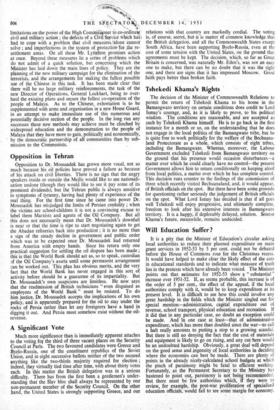Opposition in Tehran
Opposition to Dr. Moussadek has. grown More vocal, not so 'much because his oil policies have proved a failure as because of his attack on civil liberties. There is no sign that the angry speakers inside or outside the Mejlis would like to see nationali- sation undone (though they would like to see it pay some of its promised dividends), but the Tehran public is always sensitive to symptoms of tyranny, having had plenty of experience of the real thing. For the first time since he came into power Dr.• Moussadek has Misjudged the limits of Persian credulity ; when the victims are school-children it is not a convincing excuse to label them Marxists and agents of the Oil Company. But all this does not necessarily mean that Dr. Moussadek's downfall is near or that the time is ripe to start negotiating again to get the Abadan refineries back into production ; it is no more than a sign of the steady decline in government and public order which was to be expected once Dr. Moussadek had returned from America with empty hands. Since his return only one practical suggestion for settling the oil dispute has been made ; this is that the World Bank should act as, so to speak, custodian of the Oil Company's assets until some permanent arrangement can. be worked out. This plan has obvious merits, and the very fact that the World Bank has never engaged in this sort of activity before should be a guarantee of its impartiality. But Dr. Moussadek's own suspicions are limitless. He now says that the readmission of British technicians "even disguised as employees of the World Bank" must be resisted. To do him justice, Dr. Moussadek accepts the implications of his own policy, and is apparently prepared for the oil to stay under the rocks of Persia rather than let any foreigners have a hand in digging it out. And Persia must somehow exist without the-oil- revenue.






































 Previous page
Previous page